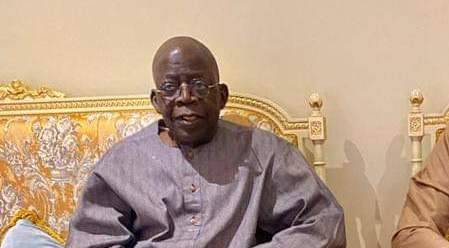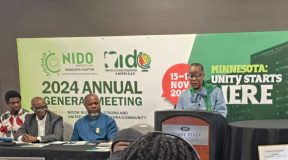By Rudolf Ogoo Okonkwo
A discreet Abuja-based think-tank invited me to the Nigerian capital for a strategic meeting. The goal is to develop a plan to rescue the South-East of Nigeria, irrespective of what is happening in other parts of the country.
The group thinks there is room to build a progressive region around the incoming governor of Anambra State, Charles Soludo, and hopeful candidates in Imo and Abia States; Emeka Ihedioha and Enyinnaya Abaribe, respectively.
I flew in and lodged at Transcorp Hilton Hotel. It was a two-day stay, so I did not alert friends in Abuja, else I would be distracted.
On the evening of our first meeting, as I was making my way to the elevator for an onward ride to the sixth-floor meeting room, I noticed members of the media rushing somewhere, with their cameras and microphones out in the open, naked, as we say in media jargon.

“What is going on?”, I asked one of them.
“There is breaking news,” he said and zoomed off.
“What is breaking?”, I asked another who rushed by.
“Asiwaju Bola Tinubu is making a big announcement,” that one said and again, zoomed off.
I looked at my wristwatch; I still had ten minutes to spare. So, the reporter in me took over. I followed the other reporters down the hall to see what was going on. Congress Hall, the venue of the event, was filled to the brim.
I found a standing-only space close to the door; I squeezed myself in, rested my back on the wall and listened to people murmuring. I tried to catch a sense of the gist, but the convener called the audience to order at that moment. He then gave a rumbustious speech, introducing the leading candidate for the 2023 Nigerian presidential election.
A bright dazzling light shone on the face of Bola Tinubu as he walked up to the podium. He appeared so young and bubbly, with a broad smile decorating his face. There was no sign of wrinkles on his forehead or bags under his eyes. His gait was strong and his steps were swift. I was not the only one taken aback by his transformation.
“Money good ooo,” the man beside me whispered. “Look at how young the man looks.” I wanted to tell the man that two weeks of drinking Ensure would do the magic on anybody, but I held my peace.
“Our next president,” the crowd shouted.
“Four more years,” others shouted.
In the middle of the hall, Tinubu waved at them and signaled the excited crowd to take their seats. There was a new relaxed impetus in his posture. It took a few minutes before the audience settled down. Bola Tinubu cleared his throat, followed the traditional Nigerian protocol of greeting dignitaries in the audience, and then started.
“When I announced that I was running for president, it inspired those of you here to visualise a brighter future for our dear country. You all deployed immediately across Nigeria, canvassing for support and selling our impeccable vision of a new Nigeria. I appreciate how you have shaken the political table of Nigeria in this short period. You have run our potential challengers out of the arena or under their mother’s bed. I appreciate you all. You are the proof that when (a) great idea rises, meets great moments, it shows the people the light.”
Something in Tinubu’s unusually smooth voice, the long smirk on his check, the periodic pursed lips, didn’t sync with the words coming out of his mouth.
Having said that, I have had ample time to consult and survey our political stage. While I can easily see that I have no equal out there; while I am sure that the presidency of Nigeria will be a cakewalk for us, I have had the time to think beyond what I want. Our beloved country has blessed me beyond my wildest dreams. At this point in my life, things that move me are beyond things that I, Asiwaju Bola Tinubu, the Jagaban want.
American author Zig Ziglar said it best, “Don’t give up what you want most for what you want now.”
He paused, looked around as if to see if the Zig Ziglars in the audience approved.
“When I look at the Nigerian landscape of 200 million citizens, of which 140 million of them are under 35 years of age, I feel that for the sake of this country’s future, men like me should play roles other than being president. It is not because our muscles are weak or that our minds are dull; far from it. Men of my generation should be satisfied being kingmakers. In that role, we can guide the new generation to lead this country with new blood and vigour, and compete with their mates across the globe. I have been all over the world, and I have seen young Nigerians do so everywhere. I believe they should be able to do the same at home.”
My eyes repeatedly blinked at this point. I glanced at the hall and it was as silent as a graveyard on a cold and dark night.
“As a result, I have decided not to run for president,” Tinubu declared. His voice was unequivocal, without an iota of doubt.
A loud hiss came off the mouth of the man standing beside me. “No, Jagaban. Iro!,” yelled someone in the middle of the hall. Another at the left side shouted, “We no go gree. We want you, Asiwaju.”
“Nigeria has a lot of capable hands to guide this country into the next decade and next century,” Tinubu continued.
“Just looking at younger people that I have mentored in Lagos State and all of the South-West, I am more than confident that you all do not need me to take this nation to the next level. I can easily mention ten names that you all know who are capable hands to take charge of this nation. These men and women have worked directly with me. And you know if they are there, I will be around overseeing what they do to make sure that they deliver the kind of consistent successes that we have delivered to the people of Lagos State since 1999.”
Another man beside me murmured to himself, “it is not the same thing.”
“I will ask other elder statesmen like Atiku Abubakar to give way for the young,” Tinubu continued. “We have to trust them to take over the baton from us. I will deploy my resources to support any of such candidates that you choose in the upcoming election.”
Tinubu paused, raised his head off the speech on the podium and surveyed the audience. He swallowed a lump of air and continued.
“What I will say next may be a lot harder for some of you to swallow. But if you trust me, if you believe in my leadership acumen, you should listen carefully and give what I will say next a serious consideration.”
I stood at attention.
“I strongly believe that our brothers and sisters from the Eastern part of Nigeria deserve a chance to produce the president of Nigeria in 2023. They are a vital part of this country. And over the years, we have judged them so unfairly and misunderstood the various political developments coming from that part of our country.”
At this point, I glanced at the audience. A stream of dejection flew across their faces. One man six feet away raised his fist in the air and said a restrained, “Yes.”
“I think we can give them a sense of belonging by together agreeing to have them produce the candidates for president from our country’s two major political parties,” Tinubu continued.
“There is no question about their great contributions to this country or is there any question about the availability of men and women from that region who have integrity, leadership talent and have worked hard and sacrificed a lot for this country? I appeal to you all to join me in changing the way we look at the South-East. Another American author and motivational speaker, Wayne Dyer, said “If you change the way you look at things, the things you look at change.”
I pinched myself.
“Some of you may say that power is not given,” Tinubu proceeded. “I have said a similar thing in the past. But as one of those who have mastered the art of giving power, I can tell you that power is entirely given. Giving out power is exactly what we have done in this country since 1959. We do it, not out of fear or because of threat. We do it as a necessary sacrifice to keep our nation moving forward as one entity. As we have seen, when we fail to do what is right, posterity punishes us.”
Again, I glanced at the audience. Some had stopped looking up the stage and were now downcast, with eyes on the floor. The photojournalists and reporters with traditional cameras were clicking away as if they would capture the soul of the man speaking, if they tried hard enough.
“I know I have burdened you all with so much this evening,” Mr Tinubu continued. “But I have to stop here for now. Let the reporters go and write tomorrow’s front-page stories. Whatever happens, I can assure you that tomorrow will be a brand-new day for our nation. I feel relieved that when the history of this country is written, it will have a small line in it about the sacrifice that we made today for the betterment of our country and, more especially, our generation unborn.
Thank you all for coming out this evening – now go and make Nigeria what you want it to be. May God bless you and bless the Federal Republic of Nigeria.”
Even though Tinubu was obviously done, the audience was still transfixed.
A look at my watch showed it was fifteen minutes after my meeting time. I removed my glasses, placed them in my breast pocket, turned around and headed out. As I left the hall, I heard a loud breakout of singing inside the hall. I listened to the chorus coming out of the doors.
“Holy, Holy Holy, Bola Ahmed Tinubu is another savior. Holy, holy…”
And then, I woke up.
Rudolf Ogoo Okonkwo teaches Post-Colonial African History at the School of Visual Arts in New York City. He is also the host of Dr. Damages Show. His books include This American Life Sef, Children of a Retired God, among others.




